We've got to known the name of George S. Clinton (who works in the world of music as songwriter and as a musical supervisor as well) in the last decades through action pictures such as the American Ninja series and Mortal Kombat, through thrillers like Wild Things and The Astronaut's Wife or through comedies like the Austin Powers trilogy. Recently he scored for the Bury My Heart at Wounded Knee which is a true story based on Dee Brown's best selling novel about slaughtered native Americans at Wounded Knee. We asked the composer about this and his former works.
How did you get acquainted with music?
I'm from Tennessee, I grew up in Chattanooga, you know where Nashville is. My mother was a church organist and she taught me the piano. I also played instruments in school, trombone and tuba and guitar. I went to college outside of Nashville and got a degree in music and also a degree in drama.
At the beginning of your career, you worked as a musical director and lyricist.
Right. When I came out here in 1969 after I've graduated from college, I got a job at Warner Brothers music as a songwriter. I wrote some songs, both music and the lyrics, and I was lucky enough to have them recorded by the likes of Joe Cocker an Michael Jackson, people like that.
How did you get started in film scoring?
I came out here with the intention of being a recording artist and songwriter. I had done some albums and one of the bands that I put together was for Cheech and Chong. They saw the band and asked me if I'd be interested in doing music for a movie. I've never done that but wanted to try it. That was 25 years ago and that's what I've been doing ever since.
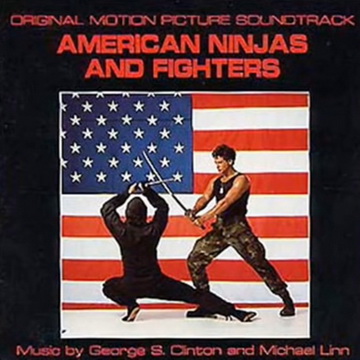 What were the early projects like? Was it hard to get your first gigs?
What were the early projects like? Was it hard to get your first gigs?In the early times, I was basically calling anybody that I knew that might be involved in films, offering to do the music for free. Just to be able to meet people and work with people on films. One of the things I used to do too that I would take movies that I liked, which were already made in terms of sound, but I wrote my own music to it just to practice. The early days had a lot to do with struggling and creating music for free or very little money just to have the experience. Than I was hired by Canon films to do American Ninja films, really low budget movies. I did a whole series of these and it gave me lots of experience too.
With so many action movies appearing in serial format, how did you try to keep your sound fresh and individual for each picture?
At a lot of times I tried to get inspiration from the location of the movie. We tried to come up with a sound that would have something to do with that location. In the Ninja movies, I had just seen a wonderful Japanese drumming team called the Kodo Drummers. I have seen them perform and I thought this is exactly the kind of music that I need for these martial arts movies. So I started using big Japanese drums for the martial arts music.
 Your big breakout score was the one done for Mortal Kombat. How did you get that assignment?
Your big breakout score was the one done for Mortal Kombat. How did you get that assignment?I was hired by Newline Pictures, I had done I guess a couple of movies for them. They already heard my American Ninja movies and all the other martial arts scores. I met with the director and we hit it off, but when they test marketed the film with a temporary score in it. They tested it with all orchestral score in it, I think they used music from The Fugitive. Of course the kids who played Mortal Kombat were used to techno music, so at the end of the test marketing, all the kids were like "No this is the wrong music, wrong music!" I haven't written my score yet, so when we had our meeting about the music, I said I had a concept. We're gonna have techno as the core, but we're also going to use Japanese drums and flutes like I had done before in the Ninja movies. We'll also have a large orchestra, but it will be all base-class instruments. There were no violins, there were no woodwinds, no trumpets, it was all just the lower part of the orchestra. I think it really worked well.
When working on the movie score, how did you tackle the fact there's already a score for the video games? What did you use from it?
We used the song that had been recorded at least a year before I think by the Immortals. That was our only acknowledgement of previous music that had been recorded for the game. So we used the song at the beginning and at one point where they're fighting, than again at the end. That was the only way we accommodated that.
As someone who assisted almost the entire revolution of electronics in film scoring, how do you feel about contemporary action scoring?
Well, I love it. I think the electronics have become more sophisticated. Now it's some time hard to determine where orchestra stops and where electronics start. Back then, it was pretty obvious and the combination was also obvious. But nowadays a lot of composers, including me, with action films will use orchestral samples for the orchestral percussion rather than recording it live, simply because it's a lot more aggressive. Sometimes I won't do that, but sometimes I will if the percussion is a major factor.
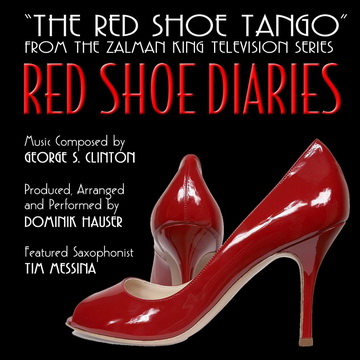 Throughout the 90s, you worked for television by scoring all the episodes of the erotic series, the Red Shoe Diaries. Did the television schedule effect your motion picture work?
Throughout the 90s, you worked for television by scoring all the episodes of the erotic series, the Red Shoe Diaries. Did the television schedule effect your motion picture work?It was interesting in the television because of the way they shot the Red Shoes Diaries, since they shot the whole series at once. So I would go in for a period of time to score that. Than I'd be done, while they spent some more time editing and getting the show ready. This wasn't like traditional TV where the composer has to be available every week to score the new show, these were all shot at once. In fact, after the first season, Zalman King who directed them would just send me scripts before they even started shooting. I would go in with a sort of ensemble and jazz music combo just to record ideas based upon the scripts I have read. Than they would actually edit the picture to my music.
Another erotic picture you did was Wild Things. What do you need to pay attention to when writing an erotic score?
The intent on that score was to have it be sleazy - sexual, but in a dirty way. Not romantic. The idea with the director was that he'd shoot the movie with all kinds of references to crocodiles and other reptiles. There's a part of our brain that's reptilian. Part of our nature is in fact reptile, and our characters in the movie had been operating from this reptilian side of the brain. So I wanted the music to have that same kind of sleazy, reptilian quality. That's why I used the baritone saxophone, because it reminded me of an alligator. Flyguitar – interesting, sweaty and there's something Southern about that. Than I used this singer as a sort of erotic lure of the swamps. It was all about swamp music.
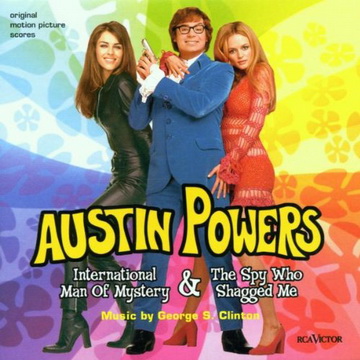 You're now has become synonymous with the Austin Powers films. How did you get the job and agreed upon the style with the filmmakers?
You're now has become synonymous with the Austin Powers films. How did you get the job and agreed upon the style with the filmmakers?It's interesting, because I got the job from, because it happened like how I told young composers – go out there and do even free music if you have to. I have done that early in my career and one of the guys that I had done that score was doing another movie and I did music for that as well. The music I had done got me the Red Shoe Diaries meeting. The music from the series got me to meet the director of The Last Days of Frankie the Fly, which was a very interesting movie with Daryl Hannah. The result was that the music from that got me the interview with Mike Myers and Jay Roach on the first Austin Powers. So in reality, if I never done that free piece, who knows if I had ever been interviewed for the Austin Powers. In the meeting, it became obvious that they were as fond of that era, the 60s as I was. I was growing up in that era and I saw all the James Bond movies when they first came out. Later came the Henry Mancini stuff, The Pink Panther... The idea to create music in that style was a thrill.
Is it easier or harder to work within the stylistic realm of other composers or a whole era?
I think it's harder, because you have to pay homage to the era, in this case the James era, John Barry, Henry Mancini and Jerry Goldsmith without ripping them off. I think that makes it more of a challenge.
Austin Powers is really a showcase for Mike Myers. Is he interested in the musical aspects at all?
He is very into it. He comes to all the playback sessions here in my studio. But he doesn't attend the scoring sessions. It's interesting that he wants to be part of the creative process here, but he says he feels that he would be a distraction at the actual scoring date when we're there with the orchestra. He says it's not an area he feels he has an expertise in. And he'd rather not be a distraction.
How did you keep your sound fresh for three movies? As new characters were appearing (Fat Bastard, Goldmember), was there enough room your themes?
It's interesting in the same way that the screen got more full and full of these characters from the first one to the third one, so did the music. In the first one, it was pretty open, having only themes for the initial characters. Carrying over those themes and adding them to the second and third one, you had less and less room to develop these individual themes. It was important for me to keep referring back to thematic materials coming from the previous movies, but to find time to develop the new themes as well because of the new characters who had more and more time on screen. I just followed what they did with the pictures and I think that helped me.
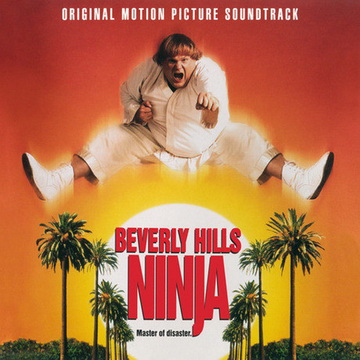 Another comedy you did was Beverly Hills Ninja. Was it fun to spoof the martial arts genre, in which you wrote several straight scores as well.
Another comedy you did was Beverly Hills Ninja. Was it fun to spoof the martial arts genre, in which you wrote several straight scores as well.It's a lot of fun. What I tried to do, except in a couple of places, is play it straight. To me, comedy works best when it's the straight man, it's not the one telling the joke -– the other man who's just staying there on the stage, trying to be serious. With the juxtaposition, the difference between the seriousness of the music and idiocy of the comedy makes the comedy funnier.
One comedy you didn't end up doing was Scary Movie 2. You're work was replaced by a score written by a dozen composers. What happened with your music?
I was hired to do that, I met the director and we seemed to be on the same page, that the movie was continuously developing. Even the ideas the director talked to me about initially began to change as well. The Weinstein's were producing it and they decided on many of the changes. I was already gone down the road to writing a score which was an orchestral horror score that didn't try to be jokey. I wanted the music to be scary – the fun part was that you realized that the jokes are funny. They are not scary, they are funny, but the music is communicating something else. The attitude changed and they decided they didn't want the music to be scary – in fact they wanted it to be funny. Rather than giving me the opportunity to make that adjustment, they decided to go with other people. In fact, what they were temping the score with was Randy Newman's Meet the Parents. That's a very light comedy score, but they decided that's what they wanted. They hired Marco Beltrami and other people to make the score sound as comedic as they could.
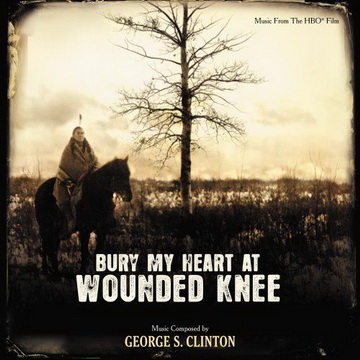 You're latest work is Bury My Heart at Wounded Knee. Based on the book by Dee Brown. What can you tell us about this project?
You're latest work is Bury My Heart at Wounded Knee. Based on the book by Dee Brown. What can you tell us about this project?I got the job because a director friend of mine, Yves Simoneau, who is a French Canadian. We made nine films together over the years, some TV movies, some miniseries and this was one of his latest jobs. He called me if I was interested, and I said "Absolutely!" I always liked working with him and the idea to do so with a drama was very intriguing to me, especially a period drama about Native Americans. I did some research on the internet, listening to some traditional Lakota music – the Lakotas are the Sioux tribe the story is about. I kept coming across the name of this master Indian flute player called John Two-Hawks. John has several albums of his own, which were all available on iTunes. I called HBO and said I would really like to have this man perform in my score. They thought it was a very good idea, so we bought him up from Arkansas, where he lives. He was there when we recorded the orchestra and the choir, we spent a day with him in the studio. I had sent him demos of my cues and a copy of the movie, so he could start getting into it. As it turned out, he had relatives that were killed at that massacre at Wounded Knee. It was a very emotional experience for him and for me as well. At the end, he thanked me the opportunity to honor the spirits of his relatives that way, which was an honor for me too.
Will it ever get a CD release?
It probably will not. Because we recorded it here in town with Union musicians. It's an excessive score – any time you use a big orchestra or a choir, recording companies have to start out paying a big amount of money before they even made a penny on the film.
When a CD of yours is released, how much do you take part in assembling the program?
I'm very involved in the selection on what should be on it. A lot of times I'll edit together shorter cues to make them longer and more listenable. If there's money to do it and time, I'll go back to the studio with my engineer and remix the music for stereo. As you know, now most scores are mixed for 5.1 audio, the theatres have the five channels and the sub-woofer audio. When you combine those tracks to stereo, it works, but it's not as effective as if you were just mixing the music for stereo. When there is time and money, I love to go back and remix it.
Which was your favorite score or genre throughout the years?
Well, it's very hard to say. I loved doing Wounded Knee, I loved the drama, the big pulling-in-your-heart string. But on the other hand, I loved working with John Waters on his crazy dirty shame movies. I loved writing a song for sex addicts in his movie. The thing I love about scoring films is that you have an opportunity to be creative in so many genres and pull in so many unusual and interesting ideas and make it part of the voice of each film. Each film has its own combination of ingredients that are unique to that film.
 What are your motivations when you're choosing which assignments to take?
What are your motivations when you're choosing which assignments to take?There are three reasons to do it as I see it. First is because its a great project. Second is because I get to work with many interesting people. Third is have a large amount of money paid to me. I figured if they are having all three of those ingredients, than I'm definitely going to do it. But I'll do it if it's only got one of them. Like if it doesn't have a famous director, it doesn't have a lot of money, but it's just a great movie. I'll do it if it's a project that is as okay movie, they don't have a lot of money, but it has a really great director I wanted to work with or if I feel it can lead to more works and I want to do a score for that person. And than I'll do it if it's not a great movie, not a great director, but they are willing to compensate me for the lack of those other too. If I had the time, I'm known to do it just for the money.
What would your dream project be?
That's a really interesting question. I would love to work on some unusual, emotional, psychological, interesting, unique film. I would love to have some of the films James Newton Howard has, like The Village or The Sixth Sense. Working with someone like M. Night Shalmayan would be an amazing experience, since he is such a highly creative person.
Apart from film scores, you also have concert works in progress as well. What are these pieces based on?
They are usually things that I come up with, although I've been asked to make some suites of music that can be played by live orchestras from my Austin Powers movies. Also I'm just doing one from The Santa Clause movies I've done that can be played around the world with live orchestra. The other concert works that are more serious are things that I just do because I have the time or something strikes me.
What are your current film projects?
Well, it's like full circle. There's a movie called Harold & Kumar 2, the second one of their movies. Their first one was a fairly popular movie – I didn't do it, but it was called Harold and Kumar Go to White Castle. The interesting thing about this and why I said it was full circle is, because they are sort of the Cheech and Chong of the 21st century. So I was starting out with Cheech and Chong – now I'm here 25 years later, working with these very talented young directors and writers who came up with this Harold and Kumar movie. It's basically a movie that's 21st century Cheech and Chong.
You've just had your 60th birthday. What do you think is the reason that most film composers are active even at this age? Can you imagine the quite life of pensioners or would you keep working as long as you could?
If it's a good assignment, I would love to keep working as long as I could. I don't know if I want to be 70 and scoring the twentieth installment of any movie. Austin Powers 20 or Big Momma's House 20. If that's what I am at that point, I'd probably just sit back, move to Tennessee, barbeque and rock on my front porch. But I don't have any plans for recording. I have a 17 year old daughter who is very interested in music. I love listening to what she is listening to because it keeps me aware and young. It's interesting that I don't feel I have run out of excitement. I still feel excited, I love coming due to my studio, turning on my gear and discovering stuff. So I guess as long as I'm affected by it and I'm healthy enough to do it, I'll be doing it
Special thanks to Tom Kidd
July 16th, 2007
July 16th, 2007








